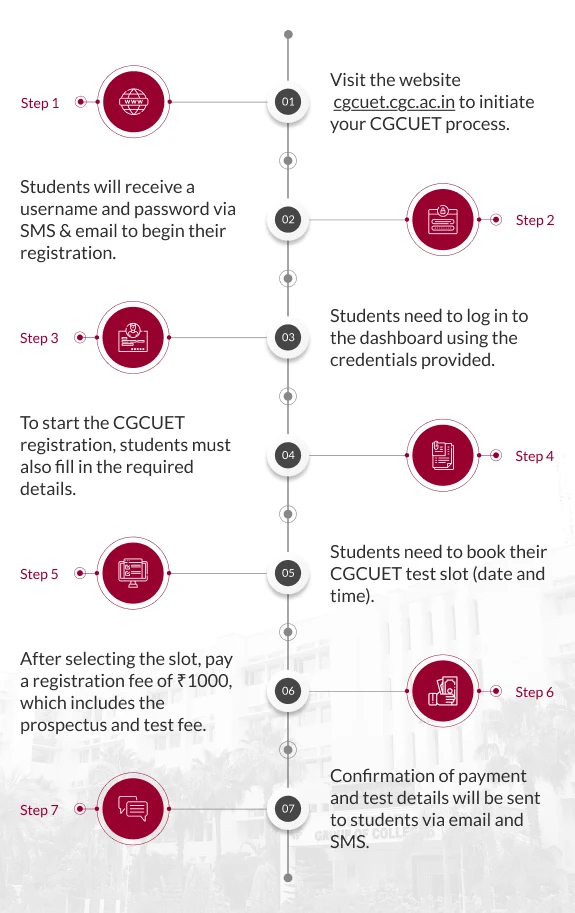College in Punjab, India
10
Among Top Private Affiliated Colleges PAN India

15
Among Top Private Colleges in North India

Admissions Open 2025-26
Top Law College in Punjab, India
Law is the study of a system of rules, usually enforced through local courts. At CGC Mohali (Jhanjeri), the Top Law College in Punjab, we combine insights from ethics, philosophy, and social sciences to build models of justice, equality, and fairness for society. Lawyers use advocacy, negotiation, and adjudication to apply these frameworks to a variety of issues, ranging from complex business deals to individual rights.
The scope of law is vast, spanning various areas, including criminal, civil, corporate, and environmental law, among others. In conclusion, legal education at the Best Law College in India serves as the foundation for developing proficient legal professionals who drive change and improve the justice system, ensuring a just and orderly society.
Apply Now

Shaping the Leaders of Justice With North India’s Premier Law College
Chandigarh Law College (CLC) at CGC Mohali (Jhanjeri) stands as the Best Law Institute in Mohali, shaping future legal professionals, advocates, judges, policymakers, and corporate lawyers. The college offers a three-year LL.B program, along with five-year integrated courses such as B.A. LL.B, B.Com LL.B, and B.B.A. LL.B, all designed to provide students with a strong foundation in law and governance. The comprehensive curriculum covers constitutional, criminal, corporate, civil, and contract law, alongside legal research methods, moot court practice, and international legal frameworks. After Law Admissions in Mohali, students gain practical exposure through internships, legal aid programs, and court visits, ensuring a real-world understanding of legal proceedings.
Ranked among the top law programs in India, CLC provides students with the knowledge, skills, and ethical foundation required to excel in the legal industry. With state-of-the-art facilities, experienced faculty, modern research centers, and industry collaborations, the college fosters critical thinking, advocacy skills, and leadership qualities. Graduates are well-prepared for diverse career opportunities as corporate lawyers, legal advisors, public prosecutors, judicial officers, human rights advocates, and legal consultants. Whether aspiring for litigation, corporate law, or public service, CLC at CGC Mohali (Jhanjeri) is the perfect launchpad for a successful legal career, making it the Best Law College in Chandigarh.
Download Brochure
Discipline Name: Law
Institute Name: Chandigarh Law College
Program offered: Under-Graduate
The Law Department at Chandigarh Law College, Jhanjeri is dedicated to providing a rigorous and enriching legal education. We empower students with the knowledge, skills, and ethical foundation to excel in the legal profession and beyond. We prepare graduates to be critical thinkers, effective advocates, and ethical leaders in a rapidly changing world. We offer diverse courses, practical experiences, and mentorship opportunities to prepare future leaders.
Message from Director
Your Path to Success: Exclusive Placement Insights
1 Crore PA
Highest Package10000+
Placement Offers1200+
Recruiters50LPA
Package Offered by 9+ Companies25-30LPA
Package Offered by 200+ Companies10LPA
Package Offered by 500+ Companies
Chandigarh Group of Colleges Mohali (Jhanjeri) Law Programs
Under-Graduate Law Courses
Aspiring to Study Abroad?
Start your journey with CGC Mohali’s (Jhanjeri) Study Abroad Programs and explore opportunities to study at top universities worldwide.

International Internship Program

Semester Exchange Program

Credit Transfer or 2+ 2 Program

Summer School Program
Student Stories

CGC Mohali (Jhanjeri) offers an exceptional law program that blends academics with real-world experience. The interactive learning approach, courtroom simulations, and expert-led workshops have sharpened my legal reasoning. The institute provides ample opportunities for internships and networking, helping us build strong careers in law. I am proud to be a part of this institution!
Tarun Singh Chauhan Placed at LUTHRA & LUTHRA LAW OFFICESStudent Stories

Studying law at CGC Mohali (Jhanjeri) has been an enriching experience. The faculty is highly knowledgeable, and the curriculum is designed to provide both theoretical and practical exposure. Moot courts, legal aid camps, and internships have helped me develop strong advocacy skills. Thanks to CGC Mohali, I feel well-prepared to take on the legal world with confidence!
Jasmeet Kaur Placed at Fourfold LegalStudent Stories

Choosing CGC Mohali (Jhanjeri) for my legal education was the best decision. The college offers excellent faculty, modern infrastructure, and hands-on training through moot courts and legal clinics. The emphasis on ethics, research, and advocacy has given me the confidence to pursue a successful career in law. CGC Mohali truly prepares its students for the challenges of the legal profession!
Yuvraj Singh Placed at AZB & PARTNERSCGCUET: An Entrance-cum-Scholarship Test
Unlock up to 100% Scholarship through CGCUET, with scholarships worth Rs 25 Crore! Get access to top-quality education at CGC Mohali (Jhanjeri) — without the financial burden.
Explore More
CGC Mohali (Jhanjeri): An Educational Hub for International Students
Offering 100+ Bachelor’s and Master’s programs, CGC Mohali (Jhanjeri) stands out as a top destination for international students seeking world-class education and global opportunities.
Explore More
How To Apply for CGCUET?
Simplify your journey! Register for the CGCUET 2025 in just a few easy steps.

Students will receive a username and password via SMS & email to begin their registration.

To start the CGCUET registration, students must also fill in the required details.

After selecting the slot, pay a registration fee of ₹1000, which includes the prospectus and test fee.


Visit the website cgcuet.cgc.ac.in to initiate your CGCUET process.

Students need to log in to the dashboard using the credentials provided.

Students need to book their CGCUET test slot (date and time).

Confirmation of payment and test details will be sent to students via email and SMS.

Empower Your Legal Journey with CGC Mohali (Jhanjeri)!
Gain legal expertise, critical thinking skills, and hands-on experience to shape a successful career in the legal field.
Launch Your Dream Career with Top-Notch Recruiters
CGC Mohali (Jhanjeri), the Top Law Institute in Punjab, empowers students with career development resources, ensuring they are fully equipped to succeed in the competitive job market.
Know More
Legal Development and Business Programs
Benefit from mentorship by leading legal professionals and support networks to elevate your legal practice toward sustained growth and innovative solutions.
Know More
Providing Legal Education with Moot Court sessions
Sharpen your legal skills at the Best Law College in India by tackling real-world problems through engaging mock trials.
Know More
Prepare for a Rewarding Future with Armed Forces Training
Shape your career and leadership skills by gaining hands-on armed forces training while pursuing your academic goals.
Know More








